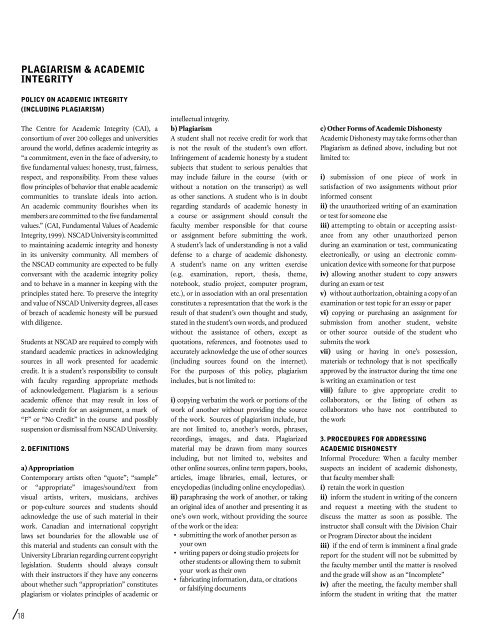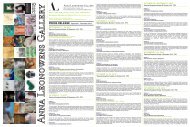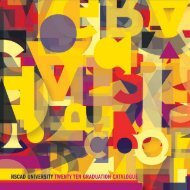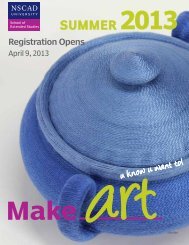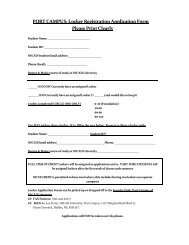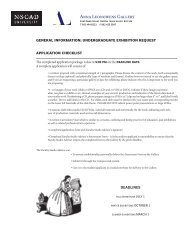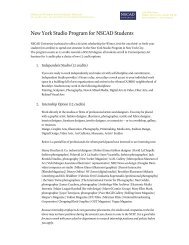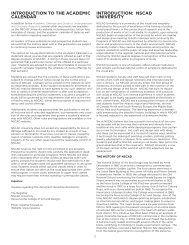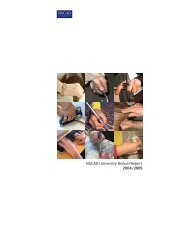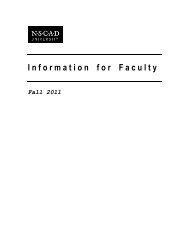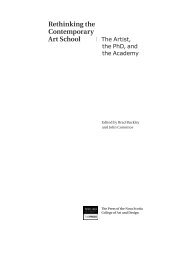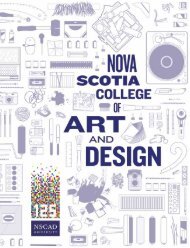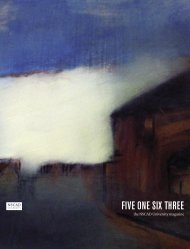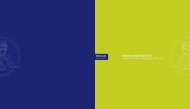2013/2014 academic calendar - Nova Scotia College of Art and ...
2013/2014 academic calendar - Nova Scotia College of Art and ...
2013/2014 academic calendar - Nova Scotia College of Art and ...
You also want an ePaper? Increase the reach of your titles
YUMPU automatically turns print PDFs into web optimized ePapers that Google loves.
PLAGIARIsM & ACADEMIC<br />
INTEGRITY<br />
POLICY ON ACADEMIC INTEGRITY<br />
(INCLUDING PLAGIARIsM)<br />
The Centre for Academic Integrity (CAI), a<br />
consortium <strong>of</strong> over 200 colleges <strong>and</strong> universities<br />
around the world, defines <strong>academic</strong> integrity as<br />
“a commitment, even in the face <strong>of</strong> adversity, to<br />
five fundamental values: honesty, trust, fairness,<br />
respect, <strong>and</strong> responsibility. From these values<br />
flow principles <strong>of</strong> behavior that enable <strong>academic</strong><br />
communities to translate ideals into action.<br />
An <strong>academic</strong> community flourishes when its<br />
members are committed to the five fundamental<br />
values.” (CAI, Fundamental Values <strong>of</strong> Academic<br />
Integrity, 1999). NSCAD University is committed<br />
to maintaining <strong>academic</strong> integrity <strong>and</strong> honesty<br />
in its university community. All members <strong>of</strong><br />
the NSCAD community are expected to be fully<br />
conversant with the <strong>academic</strong> integrity policy<br />
<strong>and</strong> to behave in a manner in keeping with the<br />
principles stated here. To preserve the integrity<br />
<strong>and</strong> value <strong>of</strong> NSCAD University degrees, all cases<br />
<strong>of</strong> breach <strong>of</strong> <strong>academic</strong> honesty will be pursued<br />
with diligence.<br />
Students at NSCAD are required to comply with<br />
st<strong>and</strong>ard <strong>academic</strong> practices in acknowledging<br />
sources in all work presented for <strong>academic</strong><br />
credit. It is a student’s responsibility to consult<br />
with faculty regarding appropriate methods<br />
<strong>of</strong> acknowledgement. Plagiarism is a serious<br />
<strong>academic</strong> <strong>of</strong>fence that may result in loss <strong>of</strong><br />
<strong>academic</strong> credit for an assignment, a mark <strong>of</strong><br />
“F” or “No Credit” in the course <strong>and</strong> possibly<br />
suspension or dismissal from NSCAD University.<br />
18<br />
2. DEFINITIONs<br />
a) Appropriation<br />
Contemporary artists <strong>of</strong>ten “quote”; “sample”<br />
or “appropriate” images/sound/text from<br />
visual artists, writers, musicians, archives<br />
or pop-culture sources <strong>and</strong> students should<br />
acknowledge the use <strong>of</strong> such material in their<br />
work. Canadian <strong>and</strong> international copyright<br />
laws set boundaries for the allowable use <strong>of</strong><br />
this material <strong>and</strong> students can consult with the<br />
University Librarian regarding current copyright<br />
legislation. Students should always consult<br />
with their instructors if they have any concerns<br />
about whether such “appropriation” constitutes<br />
plagiarism or violates principles <strong>of</strong> <strong>academic</strong> or<br />
intellectual integrity.<br />
b) Plagiarism<br />
A student shall not receive credit for work that<br />
is not the result <strong>of</strong> the student’s own effort.<br />
Infringement <strong>of</strong> <strong>academic</strong> honesty by a student<br />
subjects that student to serious penalties that<br />
may include failure in the course (with or<br />
without a notation on the transcript) as well<br />
as other sanctions. A student who is in doubt<br />
regarding st<strong>and</strong>ards <strong>of</strong> <strong>academic</strong> honesty in<br />
a course or assignment should consult the<br />
faculty member responsible for that course<br />
or assignment before submitting the work.<br />
A student’s lack <strong>of</strong> underst<strong>and</strong>ing is not a valid<br />
defense to a charge <strong>of</strong> <strong>academic</strong> dishonesty.<br />
A student’s name on any written exercise<br />
(e.g. examination, report, thesis, theme,<br />
notebook, studio project, computer program,<br />
etc.), or in association with an oral presentation<br />
constitutes a representation that the work is the<br />
result <strong>of</strong> that student’s own thought <strong>and</strong> study,<br />
stated in the student’s own words, <strong>and</strong> produced<br />
without the assistance <strong>of</strong> others, except as<br />
quotations, references, <strong>and</strong> footnotes used to<br />
accurately acknowledge the use <strong>of</strong> other sources<br />
(including sources found on the internet).<br />
For the purposes <strong>of</strong> this policy, plagiarism<br />
includes, but is not limited to:<br />
i) copying verbatim the work or portions <strong>of</strong> the<br />
work <strong>of</strong> another without providing the source<br />
<strong>of</strong> the work. Sources <strong>of</strong> plagiarism include, but<br />
are not limited to, another’s words, phrases,<br />
recordings, images, <strong>and</strong> data. Plagiarized<br />
material may be drawn from many sources<br />
including, but not limited to, websites <strong>and</strong><br />
other online sources, online term papers, books,<br />
articles, image libraries, email, lectures, or<br />
encyclopedias (including online encyclopedias).<br />
ii) paraphrasing the work <strong>of</strong> another, or taking<br />
an original idea <strong>of</strong> another <strong>and</strong> presenting it as<br />
one’s own work, without providing the source<br />
<strong>of</strong> the work or the idea:<br />
• submitting the work <strong>of</strong> another person as<br />
your own<br />
• writing papers or doing studio projects for<br />
other students or allowing them to submit<br />
your work as their own<br />
• fabricating information, data, or citations<br />
or falsifying documents<br />
c) Other Forms <strong>of</strong> Academic Dishonesty<br />
Academic Dishonesty may take forms other than<br />
Plagiarism as defined above, including but not<br />
limited to:<br />
i) submission <strong>of</strong> one piece <strong>of</strong> work in<br />
satisfaction <strong>of</strong> two assignments without prior<br />
informed consent<br />
ii) the unauthorized writing <strong>of</strong> an examination<br />
or test for someone else<br />
iii) attempting to obtain or accepting assist-<br />
ance from any other unauthorized person<br />
during an examination or test, communicating<br />
electronically, or using an electronic comm-<br />
unication device with someone for that purpose<br />
iv) allowing another student to copy answers<br />
during an exam or test<br />
v) without authorization, obtaining a copy <strong>of</strong> an<br />
examination or test topic for an essay or paper<br />
vi) copying or purchasing an assignment for<br />
submission from another student, website<br />
or other source outside <strong>of</strong> the student who<br />
submits the work<br />
vii) using or having in one’s possession,<br />
materials or technology that is not specifically<br />
approved by the instructor during the time one<br />
is writing an examination or test<br />
viii) failure to give appropriate credit to<br />
collaborators, or the listing <strong>of</strong> others as<br />
collaborators who have not contributed to<br />
the work<br />
3. PROCEDUREs FOR ADDREssING<br />
ACADEMIC DIsHONEsTY<br />
Informal Procedure: When a faculty member<br />
suspects an incident <strong>of</strong> <strong>academic</strong> dishonesty,<br />
that faculty member shall:<br />
i) retain the work in question<br />
ii) inform the student in writing <strong>of</strong> the concern<br />
<strong>and</strong> request a meeting with the student to<br />
discuss the matter as soon as possible. The<br />
instructor shall consult with the Division Chair<br />
or Program Director about the incident<br />
iii) if the end <strong>of</strong> term is imminent a final grade<br />
report for the student will not be submitted by<br />
the faculty member until the matter is resolved<br />
<strong>and</strong> the grade will show as an “Incomplete”<br />
iv) after the meeting, the faculty member shall<br />
inform the student in writing that the matter


